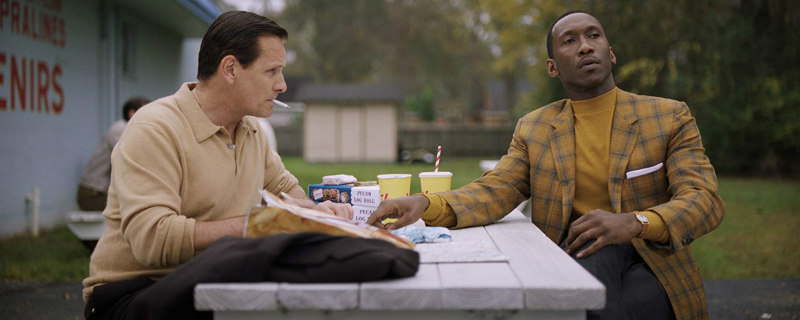
In 1960s America, a black pianist hires a white man to act as his driver/bodyguard on a tour of the South.
Review by Musanna Ahmed
Directed by: Peter Farrelly
Starring: Viggo Mortensen, Mahershala Ali, Linda Cardellini

Every year, London Film Festival goers are treated to a surprise film, generally one that's received acclaim in previous festivals. Last year was Lady Bird, the year before was Sully… which may be a choice that stretches the definition of "critically acclaimed." Regardless, the quality both of those films share in common is that they're very mainstream-friendly. In a bid to delight all audiences once more, the surprise film at LFF 2018 turned out to be Green Book. It’s a perfect choice.
Based on a true story, this comedy-drama follows a working-class Italian-American man, Tony 'Lip' Vallelonga (Viggo Mortensen), who gets over-aggressive one night on the job as a bouncer, leading to the search for other work. An opportunity arises when classical pianist Don 'Doctor' Shirley (Mahershala Ali) invites him to be his chauffeur for the musician's tour across the deep South. This is all happening in the early '60s, so Don is looking for a white man who could also double as security detail, and Tony's recent spate instills confidence in his choice. Yes, this plot is an inverse of Driving Miss Daisy.


Where Miss Daisy was guilty of the 'magical negro' archetype, Green Book infrequently enters 'white saviour' territory, though it's justified by the historical context. Furthermore, Tony is the one who evolves by the end of their time together, whereas the writing doesn't give space to depict Don’s personal developments. This can be attributed to the fact that the film is co-written and produced by Nick Vallelonga, Tony's son, so his father’s perspective is naturally the one we’ll be given. There’s an air of mystery to Mr Shirley, and some scenes imply a lack of knowledge of his daily life. This itself comes at the risk of heavily idealising the man, playing out like the writers’ fantasy of who he was, but it just takes one important scene - where he laments his status in the USA, referring to the treatment of African-Americans - to quell this fear. This scene encapsulates what the reality was for black Americans, even when they were successful like Shirley.
Ali’s performance is magnificent. There’s something meta in his casting; he elevated to a higher status in Hollywood following his award-winning turn in Moonlight, so playing such a role works better now than it would have prior to his Oscar victory. He makes you believe in the extreme musical talents of Don Shirley, absolutely embodying him during the concert scenes, with no camera tricks to suggest someone else’s hands are playing the piano à la The Pianist. The Doctor’s regal dresses look natural on him and his perfect posture and cadence are unfeigned.

Mortensen is his equal, completely transforming into a stereotypical New Yorker, but to such an extent that it becomes impossible to believe he based his performance on stereotypes because he completely lives in the character. It’s genuinely possible to forget that it’s the same actor who played Aragorn, Sigmund Freud, a couple of Cronenberg protagonists, etc. It helps that his character is as dumb as a rock, and you believe that he’s a product of sheltered, overprotective family as opposed to an intentionally ignorant fool.
The screenplay is both hilarious and poignant. It works in sync with director Peter Farrelly’s broad comic sensibilities while also showing he’s able to show some gravitas in creating a dramatic moment, albeit the seriousness is undermined by a Dreamworks-y (you know the type) score which borders on the mawkish. Much of the humour is derived from the subversive racial relationship. We don’t laugh at Tony’s outlandish, politically incorrect remarks; we laugh at how absurdly wrong he is in his view of his black boss. Farrelly’s signature slapstick humour doesn’t have presence as the script consists of mostly verbal jokes and in fact one of the best recurring bits - Don helping Tony write letters to his wife Dolores (Linda Cardellini) - works because of the verbosity.

By design, Green Book looks to be a potentially misguided piece of work but this 'odd couple' comedy wins you over because of two charming actors heavily committed to their craft and a director who knows how to make us laugh but understands to never understate the social commentary. Obviously, Farrelly’s film isn’t gonna solve racism, but its broad commercial reach could maybe change hearts, which is good enough. It may be rejected by some who refuse to see its execution as anything other than commercial bait - or even Oscar-bait - but the mass audience will surely eat it up. It’s a perfect movie for a multi-generational cinema trip, both highly entertaining and thought-provoking. One can hope Green Book is a hit, because it’s such a crowd-pleaser. Certainly, this crowd member smiled all the way through. Who knew a film about race relations in Civil Rights-era America would be so much fun?

Green Book is in UK/ROI cinemas February 1st, 2019.
"With today's Hollywood so reluctant to indulge in politics, we may have to rely on this era of filmmaking for commentary on our own unjust times."— 𝕋𝕙𝕖𝕄𝕠𝕧𝕚𝕖𝕎𝕒𝕗𝕗𝕝𝕖𝕣.𝕔𝕠𝕞 🎬 (@themoviewaffler) June 6, 2019
UNDER FIRE is on blu-ray June 17th from Eureka Classics.
Read @hilliseric's reviewhttps://t.co/aRLRC4EJdx pic.twitter.com/FLpz6iNd0b

